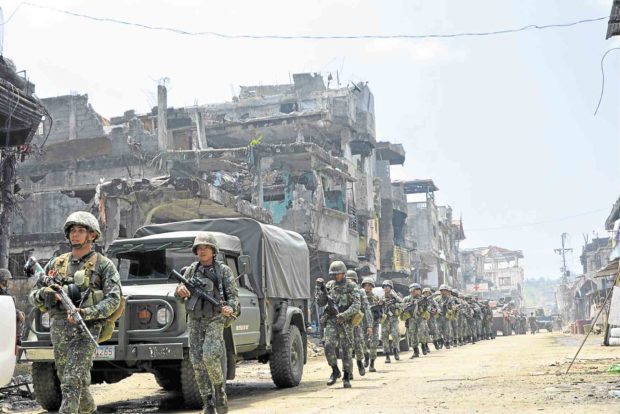
Philippine Marines patrol the highway at Barangay Bubong Madaya, Marawi City, which saw the main battles between government troops and the Islamic State-inspired Maute terrorist group. —Divina M. Suson
While he continued to push for the separation of the Philippine Marine Corps (PMC) from the Philippine Navy, Marines chief Maj. Gen. Alvin Parreño said they will continue to obey the chain of command regardless of the outcome of legislation.
“Every Marine personnel is in favor pero kung ano man ang kahinatnan nun (but whatever happens), we will always obey the chain of command,” he told reporters Monday.
The PMC Act (House Bill No. 7304) proposes to establish the PMC, currently under the Philippine Navy’s command, as an independent branch of service of the Armed Forces of the Philippines.
“As their representative, it is my duty to express kung anuman ang sentiment ng mga tao under me (the sentiments of the people under me). Lest I will be remiss of my duty and my obligation as their representative in looking out for the welfare of the men and for the accomplishment of their mission,” Parreño said.
READ: Marines chief backs proposal to create new AFP branch of service
Defense Secretary Delfin Lorenzana had earlier thumbed down the proposal, saying that a new branch of service for the Marines would make two ground forces for the military. The other is the Philippine Army, the biggest branch of service of the AFP.
The PMC was intended to be a small striking force when it was created in 1950 through a General Headquarters order.
Parreño said the support on social media to create a new branch for the Marines is heartwarming but clarified that they won’t break from the chain of command if they won’t be split from the Navy.
“Marami kaming nababasa sa Facebook na they are supporting us and nakakataba ng puso ‘yun. Pero gaya ng sabi namin, the commander-in-chief has the last say,” he added.
(We read a lot of posts on Facebook supporting us and it fills our hearts. But like we said, the commander-in-chief has the last say.)
The Marines chief explained that they don’t intend to compete with other branches of service, but they also have to fill up their table of organization.
“The other branches of service, they may have other things, missions to do, but we also believe that we have some tasks to perform also in operations. We have built this expertise, 67 years of experience in amphibious operations,” he said.
The PMC’s current strength is estimated at around 9,000. The Marines chief says that 12,000 is their ideal number of troops.
As an archipelagic nation with strategic locations like the West Philippine Sea and the Philippine Rise, Parreño said “the more we need Marines which will be guarding the islands that are separated from the big islands.”
While he said most of their concerns are addressed, he cited the need to step up their modernization. If the legislation is passed, they will be free from structural limitations.
The transition would not happen right away, as it may take a few years if the legislation is passed. “The PMC is always tied up with the Philippine navy, although it might become a separate branch of service, but we will see to it that the umbilical cord is always there. We are amphibious in nature… We know that the sea is not an obstacle, but a maneuver space for us so it’s a different perception on our part,” Parreño said. /je